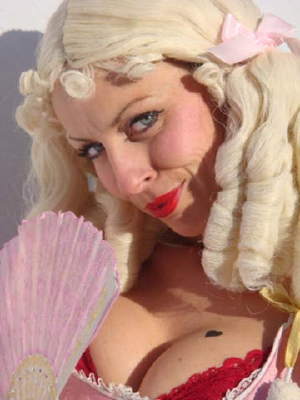Three Hours after Marriage at the Union Theatre
John Gay, author of The Beggar's Opera which was later adapted by Brecht into Threepenny Opera, wrote Three Hours after Marriage in the 1700s.

It was deemed too risqué by critics after a popular run and has hardly been performed since. This play is most certainly of its time. Eighteenth century satirical comedy full of farce and fancy though performed in a very 21st century environment and it is this that throws up some issues of time and place.
The plot centres on the newly and secretly married Dr. Fossile and Mrs. Townley and her two lovers Plotwell and Underplot. Letters are exchanged, disguises donned and one of the lovers even hides in the bride's petticoats – all good, honest, if not particularly virginal, fun.
The set (conceived by Mike Lees and designed by Chloe Ireland) gives a cartoonist tone to 18th century style, with bright backdrops and comical props. Costumes (designed by Eva Le Blanc) follow a similar suit, although the appearance of modern jeans and shirts on Plotwell and Underplot jars rather than creates meaningful symbolism and connections to the modern age.
The melodrama is played with enthusiasm by the cast, Penny Scott-Andrews creating a wonderfully bizarre and focused character of the eccentric author niece of the Doctor. Her towering stature over other characters makes some visual snapshots that are particularly absurd (in the best possible meaning of the word).
I found the pitch of Rebecca McKinnis' Mrs. Townley uncomfortably shrill at times, though she portrays the bad-girl-plays-the-innocent with wit and aplomb. Jonathan Peck creates a dazzling array of characters that appear for only a few seconds before disappearing again, which is a shame as it leaves little time to absorb these moments of humour. His physicality and vocal range is remarkable, from an extremely stuttering post-boy to the monotone indifference of a sailor lumbered with a baby.
Mark Leipacher's Underplot provides a welcome relief to all the melodramatic swooning and wailing. He seems to play the comedy in a more up to date style, with wry smiles and a slower pace. It was his lines that got me laughing out loud. But perhaps in an age of sarcasm and over-intellectualised performance one should break free and simply enjoy a bit of silliness every so often. And not constantly be looking for the 'concept' and the hidden meaning.
The pace of 3 hours builds nicely to a climax at the end of the first act, realising its farcical potential. This picks up again in the second act with silly costumes and general jolliness. The piece winds down nicely with a bittersweet ending that concludes matters in a way that's best for one and all, though this seems rather abrupt and a little more time to cool things down would make the piece more well rounded.
Unfortunately, to a modern audience, 18th century theatre can miss the mark – especially in such a small performance area. This piece really needs a bigger space. Such camp frolicking is difficult to appreciate at close quarters and in such a gritty urban theatre. This kind of theatre was created to be performed at some distance from the audience, with regular interruptions from the Orange Girls and notes arriving from admirers from across the auditorium.
Then again, as a well intentioned and well meaning comedy 3 Hours satisfies. It may even cause the audience member to relax a little and simply enjoy theatre for entertainments sake rather than the sake of allegory and satire, which is present in Gay's work but, is not the allegory and satire of the 21st century. One can see why John Gay is most remembered for Brecht's reincarnation of The Beggar's Opera as Threepenny rather than his original. These are plays out of time and place and it takes a modern retelling to give them relevance and the ability to affect a modern audience. A retelling that is somewhat lacking in conviction in this production.
Comments
Share
The SE1 website is supported by people like you
Follow us
Email newsletter
For the latest local news and events direct to your inbox every Monday, you need our weekly email newsletter SE1 Direct.

